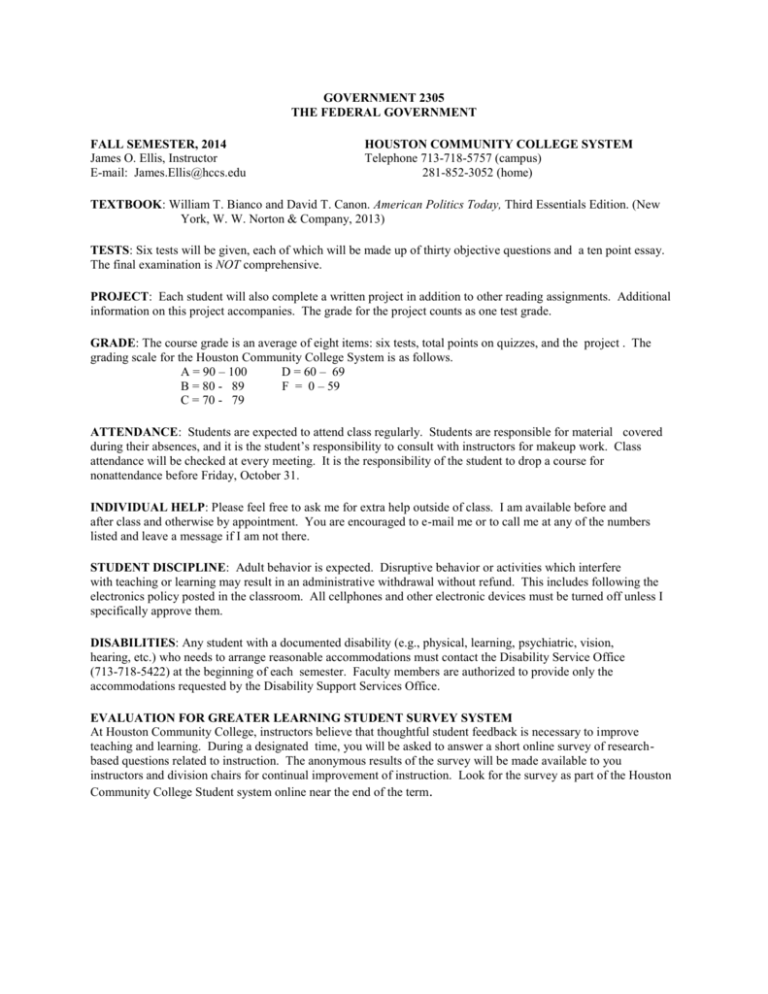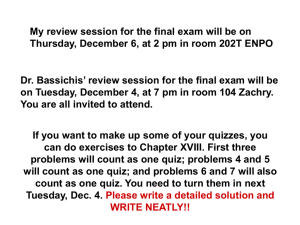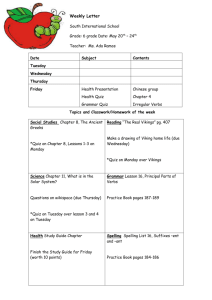HCCS 2305 Syllabus - Fall Regular Term 2014
advertisement

GOVERNMENT 2305 THE FEDERAL GOVERNMENT FALL SEMESTER, 2014 James O. Ellis, Instructor E-mail: James.Ellis@hccs.edu HOUSTON COMMUNITY COLLEGE SYSTEM Telephone 713-718-5757 (campus) 281-852-3052 (home) TEXTBOOK: William T. Bianco and David T. Canon. American Politics Today, Third Essentials Edition. (New York, W. W. Norton & Company, 2013) TESTS: Six tests will be given, each of which will be made up of thirty objective questions and a ten point essay. The final examination is NOT comprehensive. PROJECT: Each student will also complete a written project in addition to other reading assignments. Additional information on this project accompanies. The grade for the project counts as one test grade. GRADE: The course grade is an average of eight items: six tests, total points on quizzes, and the project . The grading scale for the Houston Community College System is as follows. A = 90 – 100 D = 60 – 69 B = 80 - 89 F = 0 – 59 C = 70 - 79 ATTENDANCE: Students are expected to attend class regularly. Students are responsible for material covered during their absences, and it is the student’s responsibility to consult with instructors for makeup work. Class attendance will be checked at every meeting. It is the responsibility of the student to drop a course for nonattendance before Friday, October 31. INDIVIDUAL HELP: Please feel free to ask me for extra help outside of class. I am available before and after class and otherwise by appointment. You are encouraged to e-mail me or to call me at any of the numbers listed and leave a message if I am not there. STUDENT DISCIPLINE: Adult behavior is expected. Disruptive behavior or activities which interfere with teaching or learning may result in an administrative withdrawal without refund. This includes following the electronics policy posted in the classroom. All cellphones and other electronic devices must be turned off unless I specifically approve them. DISABILITIES: Any student with a documented disability (e.g., physical, learning, psychiatric, vision, hearing, etc.) who needs to arrange reasonable accommodations must contact the Disability Service Office (713-718-5422) at the beginning of each semester. Faculty members are authorized to provide only the accommodations requested by the Disability Support Services Office. EVALUATION FOR GREATER LEARNING STUDENT SURVEY SYSTEM At Houston Community College, instructors believe that thoughtful student feedback is necessary to improve teaching and learning. During a designated time, you will be asked to answer a short online survey of researchbased questions related to instruction. The anonymous results of the survey will be made available to you instructors and division chairs for continual improvement of instruction. Look for the survey as part of the Houston Community College Student system online near the end of the term. GOVERNMENT 2305 COURSE CALENDAR CRN 29276 - TTh 12:30 – 2:00 Unit I Explain the origin and development of constitutional democracy in the United States. Demonstrate knowledge of the federal system. Describe separation of powers and checks and balances in both theory and practice. Thursday, August 28 QUIZ, chapter 1 Thursday, September 4 QUIZ, chapter 2 Tuesday, September 9 QUIZ, chapter 3 Thursday, September 11 TEST I Unit II Evaluate the role of public opinion and interest groups in the political system. Thursday, September 18 QUIZ, chapter 5 Thursday, September 25 QUIZ, chapter 8 Tuesday, September 30 TEST II Tuesday, October 7 Tuesday, October 14 Thursday, October 16 Unit III Evaluate the role of political parties in the political system. Analyze the election process. QUIZ, chapter 6 QUIZ, chapter 7 TEST III Unit IV Demonstrate knowledge of the legislative branch of the federal government. Analyze issues and policies in U. S. politics Tuesday, October 21 PROJECT DUE Thursday, October 23 QUIZ, chapter 9 Tuesday, October 28 QUIZ, chapter 14 Tuesday, November 4 TEST IV Unit V Demonstrate knowledge of the executive branch of the federal government. Analyze issues and policies in U. S. politics. Thursday, November 6 QUIZ, chapter 10 Tuesday, November 11 QUIZ, chapter 11 Thursday, November 13 QUIZ, chapter 15 Thursday, November 20 TEST IV Unit VI Demonstrate knowledge of the judicial branch of the federal government. Describe the rights and responsibilities of citizens. Tuesday, November 25 QUIZ, chapter 12 Tuesday, December 2 QUIZ, chapter 4 Thursday, December 4 QUIZ, chapter 13 Thursday, December 11 TEST VI BOOK REPORT 1. Choose a book from the following list or another book which interests you. Once you have the book in hand, come and reserve that title in your name; the first student to bring me a book is the only one who may report on that one this semester. If you wish to choose a book not on this list, you must clear it with me; I will approve books at least 250 pages long and having sufficient political content. Look for appropriate books in college libraries, public libraries, book stores, maybe even at home. Find and reserve your book promptly, in order to get one you want and to allow time to read it and prepare your report. Acheson Present at the Creation Barber The Presidential Character Beard An Economic Interpretation of the Constitution of the United States Bolton Surrender Is Not an Option Breyer Active Liberty - Interpreting Our Democratic Constitution Bush Decision Points Bush and Scowcroft A World Transformed Caro Master of the Senate Caro The Passage of Power Carter Keeping Faith Charen Do-Gooders Charen Useful Idiots Cheney In My Time Chernow Alexander Hamilton Clinton My Life Courtois The Black Book of Communism Crile Charlie Wilson’s War Crowley Nixon Off the Record Drury Advise and Consent Drury A Shade of Difference Drury Capable of Honor Drury Preserve and Protect Drury Come Nineveh, Come Tyre Drury The Promise of Joy Ellis Founding Brothers Ellis His Excellency Elazar American Federalism - A View from the States Fiorina Culture War: The Myth of a Polarized America Ford A Time to Heal Friedman Capitalism and Freedom Ginsburg Supreme Court Decisions and Women’s Rights Goldberg Liberal Fascism Goodwin Team of Rivals Hamilton How Congress Works Hastert Speaker Hayek The Road to Serfdom Horowitz Radical Son Isaacson Benjamin Franklin - An American Life Johnson The Vantage Point Lewis Gideon’s Trumpet Meacham American Lion McCullough John Adams McCullough Truman Morris Dutch Murray Losing Ground - American Social Policy 1950-1980 Neustadt Presidential Power Nixon RN - The Memoirs of Richard Nixon Nixon Real Peace Noonan What I Saw at the Revolution Novak The Prince of Darkness Obama Dreams from My Father Obama The Audacity of Hope Olasky The Tragedy of American Compassion O’Connor The Last Hurrah O’Sullivan The President, the Pope, and the Prime Minister Podhoretz World War IV Powell My American Journey Putnam Bowling Alone: The Collapse and Revival of American Community Reagan An American Life Rehnquist Grand Inquests Rehnquist The Supreme Court Rice No Higher Honor Rossiter 1787 - Grand Convention Rumsfeld Known and Unknown Shlaes The Forgotten Man Shultz Turmoil and Triumph Schweizer Architects of Ruin Sowell Black Rednecks and White Liberals Sowell The Economics and Politics of Race Sowell The Vision of the Anointed Stossel Give Me a Break Stossel Myths, Lies, and Downright Stupidity Thatcher Statecraft Thernstrom America in Black and White Tocqueville Democracy in America Toobin The Nine: Inside the Secret World of the Supreme Court Warren All the King’s Men Washington Up From Slavery White The Making of the President, 1960 White The Making of the President, 1964 White The Making of the President, 1968 White The Making of the President, 1972 White America in Search of Itself - The Making of the President 1956-1980 Wilson Congressional Government Zinn A People’s History of the United States 2. Prepare a written report of 1,000 to 1,500 words (approximately four to six pages), including the following elements: a. Bibliographical information: author, title, city of publication, publisher, copyright date. b. Some background on the author: career, previous writings, and the like. c. A summary of the content: generally a paragraph per chapter unless the book contains really long or really short chapters. d. Your critical evaluation of the book. SCHOLASTIC DISHONESTY includes, but is not limited to cheating on a test, plagiarism, and collusion. Cheating on a test includes copying from another student’s test paper; using, during a test, materials not authorized by the person giving the test; collaborating with another student during a test without authority; knowingly using, buying, selling, stealing, transporting, or soliciting in whole or part the contests of an unadministered test; or bribing another person to obtain a test that is to be administered. “Plagiarism” means the appropriation of another’s work and the unacknowledged incorporation of that work in one’s own written work for credit. “Collusion” means the unauthorized collaboration with another person in preparing written work offered for credit. CORE OBJECTIVES The Higher Education Coordinating Board (THECB) mandates that the core curriculum must ensure that students will develop the essential knowledge and skills they need to be successful in college, in a career, in their communities, and in life. Through the Texas Core Curriculum, student will gain a foundation of knowledge of human cultures and the physical and natural world, develop principles of personal and social responsibility for living in a diverse world, and advance intellectual and practical skills that are essential for all learning. Students enrolled in GOVT 2305/2306 core curriculum courses will complete assessments designed to measure the following core objectives: Critical Thinking Skills – to include creative thinking, innovation, inquiry, and analysis, evaluation, and synthesis of information. Communication Skills – to include effective development, interpretation, and expression of ideas through written, oral, and visual communication. Personal Responsibility – to include the ability to connect choices, actions, and consequences to ethical decisionmaking. Social Responsibility – to include the ability to connect choices, actions, and consequences to ethical decisionmaking. Student assessment of proficiencies mandated by the THECB may include testing, projects, or assignments.





